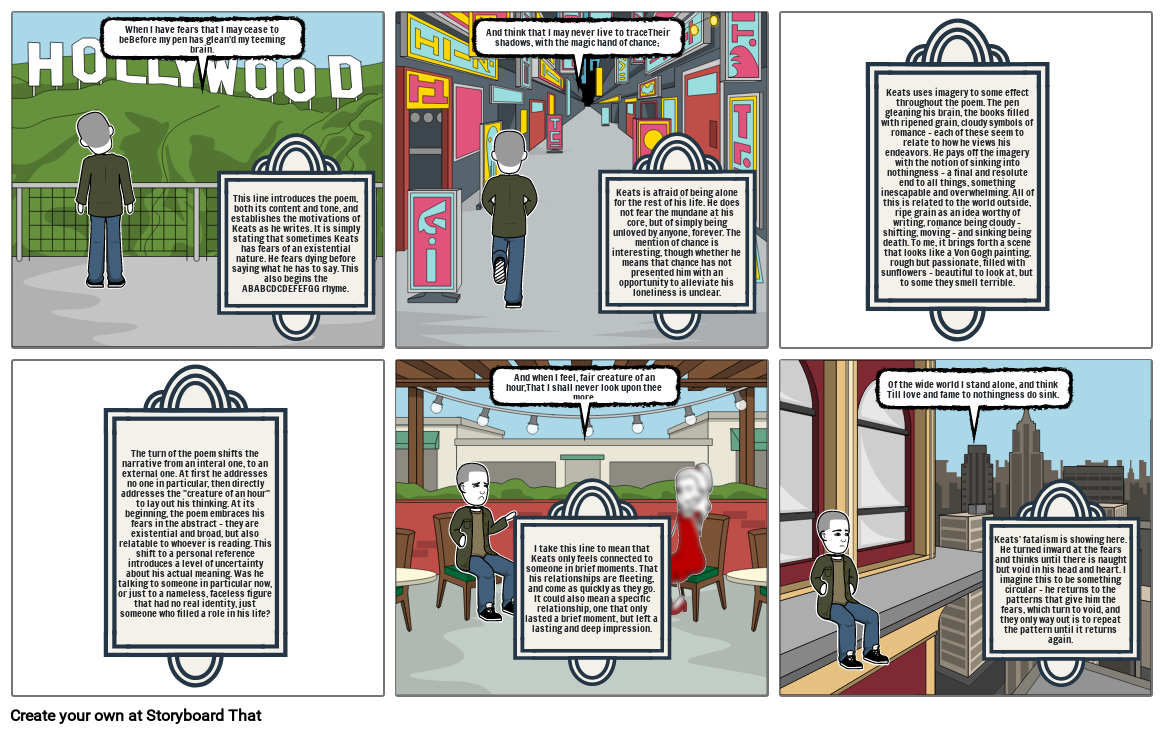When I Have Fears

Montāžas Teksta
- When I have fears that I may cease to beBefore my pen has glean'd my teeming brain,
- This line introduces the poem, both its content and tone, and establishes the motivations of Keats as he writes. It is simply stating that sometimes Keats has fears of an existential nature. He fears dying before saying what he has to say. This also begins the ABABCDCDEFEFGG rhyme.
- And think that I may never live to traceTheir shadows, with the magic hand of chance;
- Keats is afraid of being alone for the rest of his life. He does not fear the mundane at his core, but of simply being unloved by anyone, forever. The mention of chance is interesting, though whether he means that chance has not presented him with an opportunity to alleviate his loneliness is unclear.
- Keats uses imagery to some effect throughout the poem. The pen gleaning his brain, the books filled with ripened grain, cloudy symbols of romance - each of these seem to relate to how he views his endeavors. He pays off the imagery with the notion of sinking into nothingness - a final and resolute end to all things, something inescapable and overwhelming. All of this is related to the world outside, ripe grain as an idea worthy of writing, romance being cloudy - shifting, moving - and sinking being death. To me, it brings forth a scene that looks like a Von Gogh painting, rough but passionate, filled with sunflowers - beautiful to look at, but to some they smell terrible.
- The turn of the poem shifts the narrative from an interal one, to an external one. At first he addresses no one in particular, then directly addresses the "creature of an hour" to lay out his thinking. At its beginning, the poem embraces his fears in the abstract - they are existential and broad, but also relatable to whoever is reading. This shift to a personal reference introduces a level of uncertainty about his actual meaning. Was he talking to someone in particular now, or just to a nameless, faceless figure that had no real identity, just someone who filled a role in his life?
- And when I feel, fair creature of an hour,That I shall never look upon thee more,
- I take this line to mean that Keats only feels connected to someone in brief moments. That his relationships are fleeting, and come as quickly as they go. It could also mean a specific relationship, one that only lasted a brief moment, but left a lasting and deep impression.
- Of the wide world I stand alone, and thinkTill love and fame to nothingness do sink.
- Keats' fatalism is showing here. He turned inward at the fears and thinks until there is naught but void in his head and heart. I imagine this to be something circular - he returns to the patterns that give him the fears, which turn to void, and they only way out is to repeat the pattern until it returns again.
Izveidoti vairāk nekā 30 miljoni stāstu shēmu

